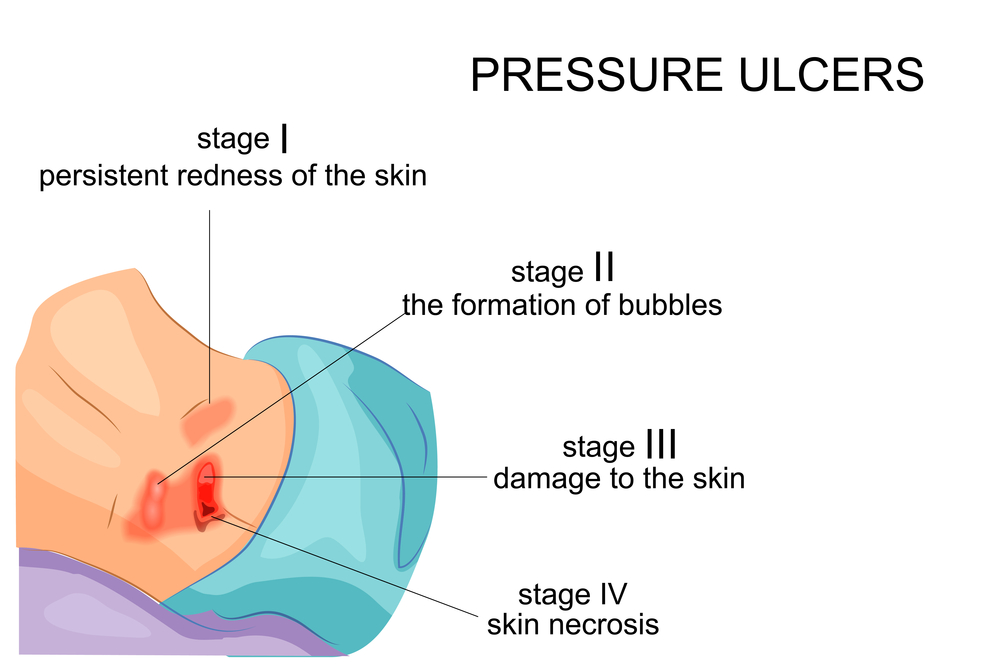On Bedrest? Here's How to Avoid Bedsores
 For busy people who don’t seem to have enough hours in the day, bedrest can sound like a dream come true. Staying in bed all day, with nothing to do but watch TV and read books? Sounds wonderful, right? But in reality, bedrest isn’t very enjoyable for long. It becomes tedious, frustrating, and lonely. And oftentimes, staying in bed all day can make you stiff and uncomfortable. It can even cause you to develop bedsores. If you’re on bedrest and concerned about bedsores, these tips will help you to avoid them.
For busy people who don’t seem to have enough hours in the day, bedrest can sound like a dream come true. Staying in bed all day, with nothing to do but watch TV and read books? Sounds wonderful, right? But in reality, bedrest isn’t very enjoyable for long. It becomes tedious, frustrating, and lonely. And oftentimes, staying in bed all day can make you stiff and uncomfortable. It can even cause you to develop bedsores. If you’re on bedrest and concerned about bedsores, these tips will help you to avoid them.
Causes of Bedsores
In order to best understand how to prevent bedsores, it’s first important that you understand what causes them. There are three primary factors that contribute to the development of bedsores:
- Pressure
- Friction
- Shearing
You’re probably familiar with what pressure and friction are. Shearing occurs when two surfaces move in opposite directions. So, as an example, if your bed is elevated and you slide down it slightly, the skin over your backbone may stay in place while your back slides down the bed.
Repositioning Frequently
Now that you understand the three factors that lead to bedsores, it’s probably quite apparent that repositioning yourself frequently as a key way to prevent bedsores from developing. By changing your position at regular intervals, you reduce the amount of pressure, friction, and shearing that occurs in one area. You should aim to change your position about once every hours. (So roughly every two episodes of your show on Netflix.)
If possible, try lifting yourself for brief periods between repositioning. You might do this by pushing yourself up with your arms, lifting your back and tailbone on the bed. But please only do this if your condition allows.
Relieving Pressure with Cushions
You can also use cushions to relieve pressure while in bed. Placing a soft cushion under your tailbone or other areas that frequently experience pressure while you’re in bed can help to prevent bedsores from developing in those areas. Try to avoid donut cushions, as this can put more pressure on surrounding tissue.
You can also use a wedge to provide yourself with elevation in bed. Just make sure that you aren’t elevating yourself more than 30 degrees, so as to prevent shearing. Alternate between using the wedge and not elevating as you change your positions.
Caring for Your Skin
Proper skincare is always important, but it’s even more so when you’re on bedrest. Caring for your skin can help to prevent bedsores from developing and can keep you more comfortable overall. If you’re not able to get out of bed for a proper shower or bath, make sure that you wash your skin with a wet cloth and gentle cleanser, then pat dry. This limits the skin’s exposure to sweat and dirt, which can cause friction in the creases of the skin.
You should also protect the skin from anything that might irritate it. Make sure your clothing doesn’t have any buttons, zippers, or stiff seams that will press on your skin. Inspect your skin daily to look for any warning signs of a bedsore developing. Get assistance for inspecting areas you can’t see yourself, and don’t be afraid to point out any areas that may feel sore or uncomfortable so that they can inspect those areas more closely.
A Note on Incontinence
Many people who are on bedrest are permitted to get up and use the bathroom. But others must stay in bed at all times, and some may struggle with incontinence in relation to their condition. In these latter 2 cases, it’s important to pay extra close attention to the skin. Exposure to urine and stool can contribute to the development of bedsores by further irritating it. Make sure that proper measures are taken to prevent exposure as much as possible—either via bedpan, colostomy bag, or absorbent underclothing. Make sure these are cleaned regularly, and any skin exposed to these substances is cleaned and dried thoroughly and frequently.
Bedrest is never enjoyable for those who actually must endure it, and bedsores will only make it more unpleasant. Make sure to follow these tips to prevent bedsores. And if you need cleaning supplies, absorbent undergarments, cushions, or wedges to help with preventing bedsores, call or stop by one of our Medical Xpress locations or Arlington Medical Supply today. We have many of these supplies readily available for you, and our staff is eager and willing to assist you in any way we can.